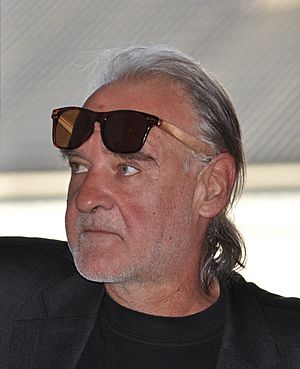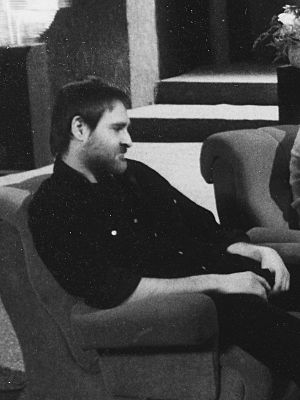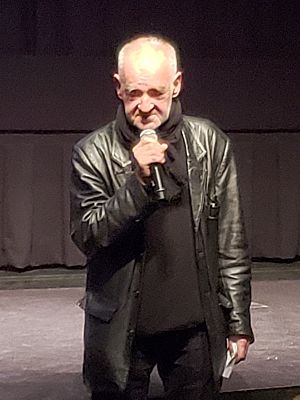Béla Tarr facts for kids
Quick facts for kids
Béla Tarr
|
|
|---|---|

Tarr at the Midnight Sun Film Festival in Sodankylä, Finland (2012).
|
|
| Born | 21 July 1955 Pécs, Hungarian People's Republic
|
| Died | 6 January 2026 (aged 70) |
| Nationality | Hungarian |
| Occupation | Filmmaker |
| Years active | 1971–2019 |
|
Notable work
|
|
| Signature | |
 |
|
Béla Tarr (born 21 July 1955 – died 6 January 2026) was a famous filmmaker from Hungary. His movies are special because they move slowly and are often in striking black and white. He used very long shots, making his films feel different from typical movies. Tarr's films often explored deep questions about life and focused on characters facing tough times. He is known for a style called "slow cinema", especially with his important film Sátántangó from 1994.
Tarr started his career with films like Family Nest (1979). These early works were about the daily lives of ordinary people, almost like a documentary. His film Almanac of Fall (1984) showed people living together in a worn-out apartment. Damnation (1988) became famous for its smooth and controlled camera movements.
Later, films like Sátántangó (1994) and Werckmeister Harmonies (2000) continued his style of showing a stark reality. Sátántangó is often considered one of the best films ever made by experts. His film The Man from London was shown at the 2007 Cannes Film Festival.
After his acclaimed film The Turin Horse (2011), Tarr decided to stop making feature films. In 2013, he opened an international film school called film.factory in Sarajevo. This school was known for its unique way of teaching, with famous filmmakers as teachers.
In his later years, Tarr explored art beyond just movies. In 2017, he created an exhibition called Till the End of the World in Amsterdam. It was a special art show that combined film, theatre, and art installation. In 2019, he created Missing People, a project that involved 250 people experiencing homelessness in Vienna.
Tarr worked closely with director and editor Ágnes Hranitzky for many years. He also collaborated with other talented artists. These included Nobel-prize winner novelist László Krasznahorkai and film composer Mihály Víg.
Contents
Early Life and First Films
Growing Up and Discovering Film
Béla Tarr was born on July 21, 1955, in Pécs, Hungary. He grew up in Budapest. His parents both worked in theatre and film. His father, Béla Tarr Sr., designed stage sets. His mother, Mari Tarr, worked at a theatre for over fifty years. His brother, György Tarr, is a painter.
When he was ten, Tarr's mother took him to an audition for Hungarian National Television. He got a role as the main character's son in a TV show based on Tolstoy's The Death of Ivan Ilyich. He had a few other small acting parts later, but he mostly focused on filmmaking.
Starting His Filmmaking Journey
For his fourteenth birthday, Tarr's father gave him an 8mm camera. At sixteen, Tarr and his friends started a filmmaking group called Dziga Vertov. They made a film called Guest Workers. This film won an award at a festival for amateur films. Because of this film, government officials at the time questioned him.
Tarr wanted to study big ideas about life, called philosophy, at university. However, he was not allowed to attend any higher education in Hungary. So, he took different jobs and kept making amateur films. He originally thought filmmaking was just a hobby. But since he couldn't go to university, he decided to become a filmmaker instead.
His Unique Filmmaking Style
Developing His Vision
Tarr's interest in filmmaking grew from age 16. He made amateur films and worked as a caretaker. Most of his early films were documentaries about workers or people facing poverty in Hungarian cities. His amateur work caught the attention of the Béla Balázs Studios. This studio helped fund his first feature film, Családi tűzfészek (Family Nest), which he started filming at age 22.
He made Family Nest with a small budget and used non-professional actors. The film showed life exactly as it was, a style called social realism. Critics noticed similarities to American director John Cassavetes. However, Tarr said he had not seen Cassavetes's films before making Family Nest, which came out in 1979.
After Family Nest, Tarr studied at the University of Theatre and Film Arts in Budapest. His next films, Szabadgyalog (The Outsider) in 1980 and Panelkapcsolat (The Prefab People) in 1981, continued this style. The Prefab People was his first film to use professional actors. In 1982, his TV adaptation of Macbeth showed a big change in his style. This film had only two very long shots.
Famous Works and Long Takes
After Almanac of Fall in 1984, Tarr started working with Hungarian novelist László Krasznahorkai. They collaborated on Kárhozat (Damnation) in 1988. Their big project, an adaptation of Krasznahorkai's novel Sátántangó, took over seven years to make. This 415-minute film was released in 1994 and received international praise.
After Sátántangó, he made a short film called Journey on the Plain in 1995. He then took a break until 2000, when he released Werckmeister Harmóniák (Werckmeister Harmonies). This film was also highly praised by critics and at film festivals.
Many shots in his later films are very long, sometimes lasting six to eleven minutes. It's even said that some single shots took a month to plan and film. The camera often moves smoothly, circling characters or following them through different scenes. For example, in Sátántangó, the camera follows a herd of cows around a village.
After Werckmeister Harmonies, Tarr began filming A Londoni férfi (The Man From London). This film was based on a novel by Georges Simenon. Its release was delayed, but it premiered at the 2007 Cannes Film Festival and was released worldwide in 2008. Tarr then worked on A torinói ló (The Turin Horse), which he said would be his final feature film.
Life After Feature Films
Teaching and New Art Forms
For many years, Tarr's films were hard to find on DVD. However, several of his important works, like Werckmeister Harmonies and Damnation, became available. In 2020, a high-quality digital restoration of Sátántangó was released on Blu-ray.
In January 2011, Tarr joined the board of a new foundation for human rights in cinema, called Cine Foundation International. He spoke out against the imprisonment of filmmakers Jafar Panahi and Mohammad Rasoulof. Tarr stated that attacking filmmaking is an attack on human culture. He believed it was everyone's duty to speak honestly about their country and loved ones.
In July 2021, Tarr was an executive producer for the horror-drama film Lamb. This film was directed by Valdimar Jóhannsson, one of his former students from the film.factory school.
Death
On 6 January 2026, Tarr died at a Budapest hospital at the age of 70. He had been ill for a long time.
Collaborations and Influence
Working with Other Artists
Director and editor Ágnes Hranitzky was Tarr’s partner in life and work. She was his film editor and co-director from 1978 until 2012. Tarr also worked with other talented people. These included Nobel-prize winner novelist László Krasznahorkai, film composer Mihály Víg, cinematographer Fred Kelemen, and actress Erika Bók.
Inspiring Other Directors
Many filmmakers have been influenced by Béla Tarr's unique style. For example, director Gus Van Sant often says Tarr greatly influenced his later films. Van Sant started using very long, continuous shots in his movies, beginning with Gerry.
Awards and Recognition
Tarr received many awards throughout his career for his filmmaking.
- In 1979, he won the Grand Prize for Family Nest at the Mannheim–Heidelberg International Film Festival.
- In 1982, he received a Special Mention Award for The Prefab People at the Locarno International Film Festival.
- Two years later, at the same festival, Tarr won the Ernest Artaria Award for Almanac of Fall.
- In 1988, he received the Bronze Rosa Camuna Award for Damnation at the Bergamo Film Meeting.
For Satantango in 1994, he won several awards:
- The Caligari Film Award at the Berlin International Film Festival.
- The National Society of Film Critics Award for Experimental Film.
- The Âge d'Or Prize in Brussels.
- The Grand Prix of the Jury at the Budapest Hungarian Film Week.
- The FIPRESCI Prize and the Golden Moon Award for Best Director at the Faro Island Film Festival.
- In 2001, he received the Berliner Zeitung Jury Award for Werckmeister Harmonies at the Berlin International Film Festival.
- In 2005, he received the France Culture Award for Foreign Filmmaker of the Year for Damnation.
- In February 2011, he won the Silver Bear Grand Jury Prize and the FIPRESCI Prize at the 61st Berlin Film Festival for his film The Turin Horse.
- In September 2012, he received a special award for lifetime achievement from BIAFF.
- In 2016, he became an Honorary Professor at the Beijing Film Academy.
- In 2017, he received an Honorary Medal and was appointed Honorary Professor at Wuhan University.
- In June 2017, he received a lifetime achievement award at the Sardinia Film Festival.
- In 2021, he received the Homeland Award in Budapest.
- In December 2022, he received a lifetime achievement award at the International Film Festival of Kerala.
- In December 2023, he received the Honorary Award of the EFA President and Board at the 36th European Film Awards.
- In 2023, he was given an Honorary Doctorate by FAMU – Prague University of the Arts.
- In November 2024, he received the Lifetime Achievement Award at the 37th Tokyo International Film Festival.
His Views on the World
Standing Up for Human Rights
In his later high school years, Tarr became an anarchist. This means he believed in a society without a strict government. He once mentioned carrying a book of political ideas, like "Mao's Bible," in his pocket. Tarr continued to consider himself an anarchist throughout his life. He was also an atheist, meaning he did not believe in God.
Thoughts on Politics and Society
Tarr was a strong critic of nationalism, which is the idea of putting one's own country above all others in a negative way.
He also spoke out about global issues. In a letter for an exhibition supporting people moving to new countries, Tarr wrote about human greed and ignorance. He questioned the morality of building fences to keep out people who are victims of wars and other problems.
Filmography
Feature Films
- Családi tűzfészek / Family Nest (1979)
- Szabadgyalog / The Outsider (1981)
- Panelkapcsolat / The Prefab People (1982)
- Őszi almanach / Almanac of Fall (1984)
- Kárhozat / Damnation (1988)
- Sátántangó / Satantango (1994)
- Werckmeister harmóniák / Werckmeister Harmonies (2000)
- A londoni férfi / The Man from London (2007)
- A torinói ló / The Turin Horse (2011)
Television and Short Films
- Macbeth (1982)
- Hotel Magnezit (1978)
- Cinemarxisme (1979)
- Utazás az alföldön / Journey on the Plain (1995)
- Visions of Europe (2004)
- segment: Prologue
Documentary Films
- Az utolsó hajó / The Last Boat (1990, 31 min), segment from City Life
- Muhamed (2017, 10 min)
- Missing People (2019, 95 min)
See also
 In Spanish: Béla Tarr para niños
In Spanish: Béla Tarr para niños
 | Selma Burke |
 | Pauline Powell Burns |
 | Frederick J. Brown |
 | Robert Blackburn |



